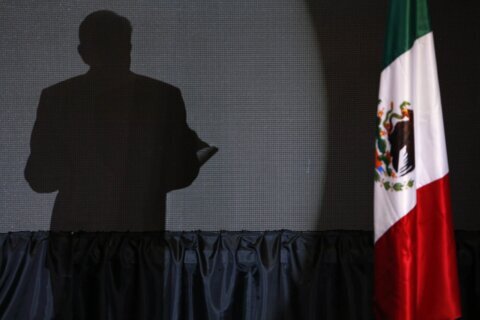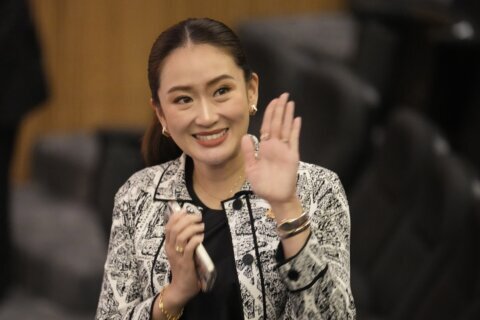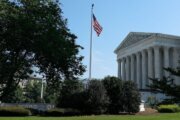Entrepreneurs and CEOs have varied college journeys
The path to business leadership doesn’t always go through B-school. Some trailblazing Black CEOs, entrepreneurs, directors, presidents and founders have MBAs and economics degrees, but others studied performing arts, public affairs, social studies and fine arts. See where these 10 innovators — in fields from media ownership and workforce management to sunscreen and whiskey — went to college.
Mellody Hobson — Starbucks, Ariel Investments
Mellody Hobson is Starbucks board chair and the co-CEO, president and director of Ariel Investments, a $14.9 billion global asset management firm. Born in Chicago, Illinois in 1969, Hobson earned a bachelor’s degree from Princeton University‘s School of Public and International Affairs in New Jersey. During college she interned at Ariel — the largest minority-run mutual fund company in the U.S. — and joined the firm after graduating. She became president of Ariel Investments in 2000 and co-CEO in 2019. At Starbucks, she was appointed director in 2005, vice chair in 2018, chair in 2021 and lead independent director in August 2024. Hobson is also a director of JPMorgan Chase and helped launch the Project Black fund, which closed with $1.45 billion in committed capital to scale sustainable minority-owned businesses to work directly with Fortune 500 companies. Time magazine named her one of its 100 most influential people in 2015.
Robert Johnson — BET, The RLJ Companies
Robert Johnson co-founded Black Entertainment Television, the first Black-owned cable television network in the U.S., and is founder and chairman of The RLJ Companies, LLC. He also owns hotel investment company RLJ Lodging Trust and has numerous business interests in gaming and sports betting, private equity, car dealerships and content streaming. Born in 1946 in Hickory, Mississippi, Johnson earned a bachelor’s degree from the University of Illinois Urbana–Champaign and a master’s degree from Princeton. He co-founded BET in 1980 with his then-wife, Sheila Johnson, and by 1991 it became the first Black-controlled company listed on the New York Stock Exchange. With the sale of BET — which had an audience of more than 70 million households — to Viacom for $3 billion in 2001, Johnson became the first Black billionaire in the U.S. In 2002 he purchased the Charlotte Bobcats NBA team — now the Charlotte Hornets — becoming the first Black majority owner of a major U.S. professional sports team.
Oprah Winfrey — Harpo Productions, Oprah Winfrey Network, oprah.com
Oprah Winfrey landed her first radio job in high school as a part-time newsreader for WVOL in Tennessee. She stayed at WVOL through her first two years at Tennessee State University, where she majored in speech communications and performing arts. She landed a television job in Nashville in 1975, leaving college one credit shy of her degree. Winfrey ultimately graduated from Tennessee State in 1986 — the same year she syndicated The Oprah Winfrey Show and launched Harpo Productions. She co-founded women’s cable network Oxygen Media in 1998, co-founded “O, The Oprah Magazine” in 2000, and in 2011 launched the Oprah Winfrey Network, where she is chair and CEO. Born in Kosciusko, Mississippi in 1954, Winfrey was named the richest African American of the 20th century by Forbes magazine. She’s also known for her prime-time celebrity interviews and as a philanthropist, author and Academy Award-winning actress.
Fawn Weaver — Uncle Nearest, Grant Sidney, Inc.
Fawn Weaver is CEO at Grant Sidney, Inc. and co-founder and chief historian at Uncle Nearest Premium Whiskey, which she launched in 2017 to honor Nathan “Uncle Nearest” Green, a formerly enslaved man who taught Jack Daniel to make whiskey in Tennessee in the 1850s. Today, Uncle Nearest boasts more than 1,075 awards and is sold in 12 countries and more than 45,000 U.S. locations. Born in 1976 and raised in Pasadena, California, Weaver launched a public relations and events firm at 18. She earned her undergraduate degree from the University of Alabama and a corporate director certi?cation from Harvard Business School in Massachusetts. Weaver was an author, real estate and tech investor and entrepreneur when she learned of Nearest Green — the first known African American master distiller — and her exhaustive research into his story inspired her to become the first African American woman to lead a major spirits brand.
Jarrid Tingle — Harlem Capital
Until he was 8, Jarrid Tingle and his young mother lived on welfare in his grandparents’ attic — an experience he says motivates his work to close the racial wealth gap. “Investment dollars are the most impactful way to level the playing field for diverse founders,” he has said. “Women and underrepresented groups represent 70% of the population but receive only 3% of venture capital.” As managing partner of venture capital firm Harlem Capital, he’s helped raise $174 million for seed-stage companies founded by women and people of color. Born in 1991 near Philadelphia, Tingle graduated cum laude with a bachelor’s in economics from the University of Pennsylvania Wharton School. He and colleague Henri Pierre-Jacques founded Harlem Capital as an angel investor syndicate in 2015. After Tingle earned his MBA from Harvard Business School in 2019, Harlem Capital evolved into a VC fund. Its mission is to invest in 1,000 diverse founders over 20 years.
Janice Bryant Howroyd — ActOne Group
Janice Bryant Howroyd is founder and CEO of ActOne Group, the largest privately held, minority- and woman-owned workforce management firm in the U.S. Born in 1952 in Tarboro, North Carolina, Howroyd was among the first students to integrate her town’s high school. She earned her bachelor’s degree in English from North Carolina Agricultural and Technical State University before moving to California. She started what became ActOne Group in the front of a Beverly Hills rug shop in 1978 with one phone, a fax machine, $500 of her own money and a $900 loan from her mother. Today, ActOne operates in 33 countries, with 2,600 employees and more than 17,000 clients worldwide. Howroyd, who also earned a master’s degree, is known as the first African American woman to found and run a billion-dollar company. In 2016, then-President Barack Obama appointed her to serve on his board of advisers on historically Black colleges and universities.
Shontay Lundy — Black Girl Sunscreen
Shontay Lundy left her 12-hour-a-day corporate job for three reasons: to find less stress and more creativity, to create a sunscreen that wouldn’t leave white residue on Black skin, and to fight the idea that people of color need no protection from the sun. “Black may not crack,” Lundy has said, “but that does not mean it won’t burn.” Born in Newburgh, New York in 1983, Lundy waited tables while she earned her degree in business economics from SUNY College–Cortland, having switched from an elementary education major. She was already laying the groundwork for Black Girl Sunscreen when she graduated with an MBA from St. Thomas University in Florida in 2016. She launched Black Girl Sunscreen, which dries completely clear, using $33,000 from her savings. BGS products are sold at Target and Ulta across the U.S. and became available in Nigeria in 2019. The business is worth $5 million, according to Forbes.
Kevin Young — National Museum of African American History and Culture
Kevin Young is director of the Smithsonian’s National Museum of African American History and Culture in Washington, D.C. Born in Lincoln, Nebraska, in 1970, he earned his bachelor’s degree from Harvard in 1992 and a master’s degree in fine arts from Brown University in Rhode Island in 1996. Young held a Stegner Fellowship in Poetry at Stanford University in California and began his career in museums in 2005 as a curator at Emory University in Georgia. Across two decades as a professor, including 11 years at Emory, he has taught at the University of Georgia and Indiana University. He is an award-winning author of 15 books of poetry and prose, has edited nine volumes of poetry and is the poetry editor of “The New Yorker.” Before becoming NMAAHC director in 2021, he directed the New York Public Library’s Schomburg Center for Research in Black Culture. He sits on the President’s Advisory Council on African Diaspora Engagement in the United States.
John H. Johnson — Ebony, Jet
John H. Johnson — unrelated to Robert Johnson — was founder and CEO of Johnson Publishing Company, the world’s largest Black-owned publishing company. Born in Arkansas City, Arkansas in 1918, Johnson attended night classes at the University of Chicago in Illinois while working as a clerk at Supreme Life Insurance Company. In 1942, still working for the insurance company — later becoming chairman and CEO — he founded Johnson Publishing and pursued his dream of launching a magazine for a Black readership. “Negro Digest” sold 3,000 copies in its first issue and later became Black World. Johnson launched “Ebony” magazine, which focused on Black success, in 1945 and “Jet,” the world’s largest African American newsweekly, in 1951. Johnson Publishing later expanded into book publishing, radio broadcasting and cosmetics. Johnson was heavily involved in the Civil Rights Movement, was inducted into the Publishing Hall of Fame and received the Presidential Medal of Freedom in 1996. He died in Chicago in 2005 at age 87.
Ron Busby, Sr. — U.S. Black Chambers, Inc.
Ron Busby, Sr. is founder, president and CEO of the nonprofit U.S. Black Chambers, Inc., a global network of independent Black chambers of commerce and business associations. Known as the “national voice of Black businesses,” the USBC under Busby also developed the ByBlack program, the first national certification exclusively for Black-owned businesses. Born in Oakland, California in 1958, Busby earned a bachelor’s in marketing and economics from Florida A&M University in 1980 and an MBA from Clark Atlanta University in Georgia in 1981. He also studied at the Tuck School of Business at Dartmouth College in New Hampshire. He grew his first business, USA Superclean, into a $15 million enterprise within a decade and worked for IBM, ExxonMobil and Xerox before becoming national vice president for Coca-Cola USA. He is a 2022 Presidential Lifetime Achievement Award honoree and serves on the White House African American Leadership Council.
Where famous Black business leaders went to college
Mellody Hobson (Starbucks, Ariel Investments), Princeton University
Robert Johnson (BET, The RLJ Companies), University of Illinois Urbana–Champaign and Princeton
Oprah Winfrey (Harpo Productions, Oprah Winfrey Network), Tennessee State University
Fawn Weaver (Uncle Nearest, Grant Sidney, Inc.), University of Alabama and Harvard Business School
Jarrid Tingle (Harlem Capital), University of Pennsylvania and Harvard Business
Janice Bryant Howroyd (ActOne Group), North Carolina Agricultural and Technical State University
Shontay Lundy (Black Girl Sunscreen), SUNY College–Cortland and St. Thomas University
Kevin Young (National Museum of African American History and Culture), Harvard University and Brown University
John H. Johnson (Ebony, Jet), University of Chicago
Ron Busby, Sr. (U.S. Black Chambers, Inc.), Florida A&M University, Clark Atlanta University and Dartmouth College
More from U.S. News
A Guide to Historically Black Colleges and Universities
How to Choose an MBA Concentration
Where 10 Famous Inventors Went to College
Where 10 Famous Black Business Leaders Went to College originally appeared on usnews.com







